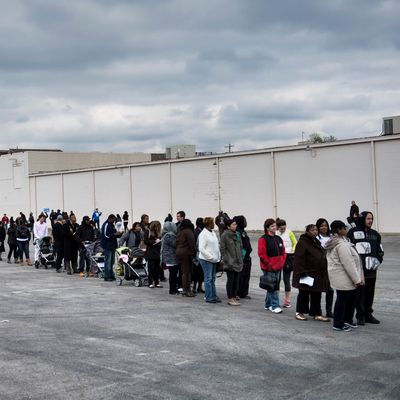
A couple of days ago, Ben Stein, the distinguished former presidential speechwriter, columnist, actor, and pitchman, appeared on Fox News to call Barack Obama “the most racist president there has ever been in America.” This was quite a charge, given that the ranks of former presidents have included advocates of scientific racism, ardent segregationists, proponents of expanding slavery, not to mention numerous slave owners. Worse than all these offenses, according to Stein, is the Obama mobilization of the African-American vote. “It’s all a way to racialize voting in this country,” he explains.
A marginally more coherent version of this argument appears on The Wall Street Journal editorial page today. “President Obama is asking for black votes as a matter of racial solidarity,” argues the Journal, “because he can’t make the case based on results.” These are expressions of the political right’s deep-seated anxiety about black voting. Unlike “normal” — i.e., white — voting, black voting is deemed to be “racial” and therefore immune to reason.
It is odd that the accusation of racial solidarity would hang over the African-American community in particular, as black voters have extensive experience voting for white candidates, while the reverse remains unusual. After two and a quarter centuries of voting exclusively for white presidential candidates, when allowed to vote at all, black Americans have finally had the chance to vote for another black American; amazingly, they stand accused of racialism.
In historical reality, the black political tradition in America is deeply infused with pragmatism born of the necessity of being an oppressed minority. Black voters have always had to form coalitions with whites, and to accept small, often minuscule, progressive measures. Even the original, radical Republican Party of Lincoln did not propose abolition. Black voters leveraged their voting power, in the pockets where it existed, for small, symbolic victories (like the invitation of Booker Washington to Theodore Roosevelt’s White House) or for piecemeal measures to restrict lynching.
That pragmatic tradition, which recognizes that white hostility circumscribes their power, remains alive today. Last month, the Journal’s news staff reported on the careful efforts of white Southern Democrats to hold together their delicate coalition of blacks and the small coterie of remaining white Democrats. The reporter found one quote that epitomizes black voting realism:
Latonia Clark, a 39-year-old postal worker, said she understood why Ms. Nunn was keeping her distance. “You’ve got to remember that she is in the state of Georgia,” she said. “The first thing she needs is to get in the door.”
It is certainly true that racial identity deeply informs African-American voting behavior, which makes blacks vote more hegemonically than other racial groups. This reflects the reality that public policy is tinged with racial implications. Racial bias in policing, employment, and sentencing remain widespread. Deep economic disparities give African-Americans a strong incentive to support the more redistributive social policies favored by Democrats.
The deep suspicion of the black vote displayed by conservatives is not completely without parallel. One can find on the left pockets of condescension toward the white working class like that expressed in Tom Frank’s What’s the Matter With Kansas?, which treated white working class social conservatism as a kind of false consciousness rather than take it seriously as a belief system. On the other hand, conservative disdain for the black vote is not only far more pervasive than any analogue on the left, it justifies a partywide agenda of imposing vote restrictions designed to dampen African-American turnout.
Republicans conceive of black voting as a kind of mass, unthinking act, something distinctly unlike the conscious thought process of white citizens. (“I guess I really actually feel we shouldn’t contort the voting process to accommodate the urban — read African-American — voter-turnout machine,” admitted one Ohio Republican.) Envisioning voters as cogs in a machine, blindly following racial cues, is a form of self-deception necessary to rationalize their abuse.






























